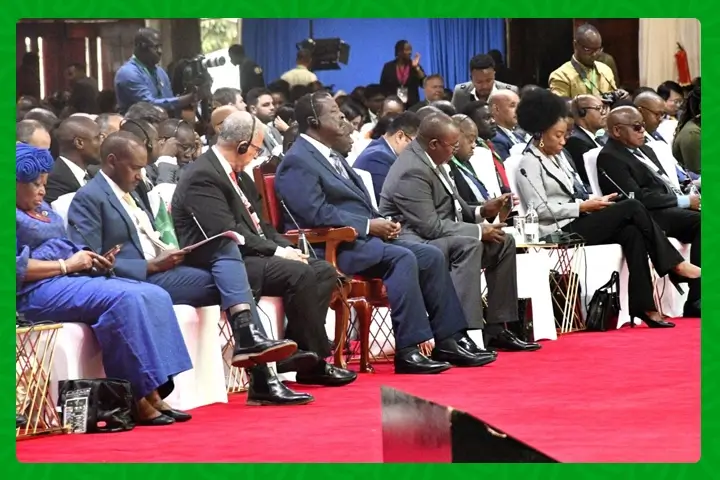
The 2024 Africa Fertilizer and Soil Health (AFSH) Summit, held from May 7th to 9th, has drawn to a close, culminating in significant strides toward revitalizing Africa’s agricultural landscape. The summit, themed “Listen to the Land,” brought together over 4,000 participants, including 57 ministers of Agriculture and Foreign Affairs, government leaders, scientists, private sector representatives, heads of development organizations, civil society leaders, and leaders of farmer organizations. The discussions focused on the urgent need to restore the nutritional balance of Africa’s depleted soils to ensure sustainable agricultural productivity.
Key Endorsements: A Step Forward for Africa’s Agricultural Future
The AFSH Summit concluded with the endorsement of the Nairobi Declaration on Fertilizer and Soil Health, which outlines thirteen critical commitments aimed at transforming soil health and fertilizer management across the continent. The declaration signifies a united front among African leaders to tackle the pressing issue of soil depletion and improve food security. Here are the four major endorsements that emerged from the summit:
1. The Nairobi Declaration on Fertilizer and Soil Health
African Heads of State and Government have endorsed the Nairobi Declaration, which emphasizes the importance of multi-stakeholder partnerships and investments to drive policies, finance, research and development, markets, and capacity building for fertilizer and sustainable soil health management. Key commitments include:
- Tripling Domestic Production and Distribution of Fertilizers: By 2034, the aim is to significantly enhance the production and distribution of certified quality organic and inorganic fertilizers to make them more accessible and affordable for smallholder farmers.
- Targeted Agronomic Recommendations: Ensuring that at least 70% of smallholder farmers receive tailored agronomic recommendations for specific crops, soils, and climatic conditions by 2034, thereby enhancing fertilizer efficiency and sustainability.
- Support for Natural Gas-Producing States: Promoting the efforts of natural gas-producing Member States to increase fertilizer production, ensuring stable and affordable prices.
- Operationalizing the Africa Fertilizer Financing Mechanism (AFFM): The AFFM will play a crucial role in improving the production, procurement, and distribution of fertilizers and soil health interventions.
2. The 10-Year Action Plan for Fertilizer and Soil Health
The summit also saw the endorsement of a comprehensive 10-year Action Plan for Fertilizer and Soil Health. This plan is designed to systematically enhance the health and productivity of Africa’s soils through a series of strategic actions and milestones. The action plan emphasizes the following:
- Mobilization of Financial and Technical Resources: The African Union (AU) Commission is tasked with mobilizing resources to support these initiatives, working closely with existing climate funds.
- Policy and Regulatory Frameworks: Developing and implementing policies that create a conducive environment for fertilizer and soil health interventions.
- Capacity Building: Promoting systemic national capacity building for locally relevant fertilizer and soil health management practices and technologies.
3. Africa Fertilizer Financing Mechanism (AFFM) for the Action Plan
The AFFM has been fully operationalized to support the action plan, providing a robust framework for financing soil health and fertilizer initiatives. This mechanism aims to:
- Improve Production and Distribution: Enhance the production, procurement, and distribution of both organic and inorganic fertilizers.
- Support Soil Health Interventions: Implement soil health initiatives that are vital for restoring soil fertility and sustaining agricultural productivity.
4. Soil Initiative for Africa Framework
The Soil Initiative for Africa framework was another major endorsement at the summit. This framework sets the stage for long-term efforts to improve soil health across the continent through:
- Knowledge Sharing and Training: Promoting African solidarity through knowledge sharing, training, and development programs that disseminate best practices in soil fertility and health.
- Access to Extension Services: Ensuring that at least 70% of smallholder farmers have access to quality extension and advisory services on fertilizer and soil health, provided by both public and private sectors.
Summit Highlights and Key Takeaways
Throughout the three-day summit, participants delved into the critical condition of Africa’s soils, emphasizing the need for urgent restorative measures. Key takeaways include:
- Severe Soil Depletion: Years of excessive use without adequate replenishment have severely depleted Africa’s soils, hindering their capacity to sustain optimal crop yields.
- Multi-Stakeholder Collaboration: The summit underscored the necessity of collaboration among governments, private sector players, and development organizations to address soil health and fertilizer challenges effectively.
- Commitment to Sustainability: The endorsed commitments and frameworks highlight a strong dedication to sustainable agricultural practices that will benefit smallholder farmers and the broader agricultural community.
The 2024 Africa Fertilizer and Soil Health Summit has set a transformative agenda for improving soil health and agricultural productivity across Africa. With the endorsement of the Nairobi Declaration, the 10-year Action Plan, the Africa Fertilizer Financing Mechanism, and the Soil Initiative for Africa framework, African leaders have demonstrated a resolute commitment to addressing the continent’s soil health challenges. These efforts are poised to drive significant progress in ensuring food security and sustainable agricultural development for the future.
Stay updated with the latest farming tips and agriculture industry news from Africa by subscribing to our newsletter. Don’t miss out on valuable insights and updates. Follow us on Twitter, LinkedIn, and Facebook to join our farming community and stay connected with us.



















